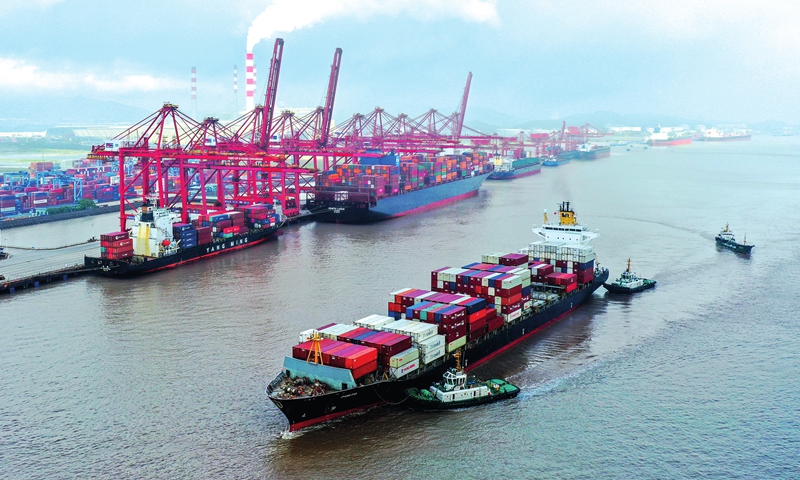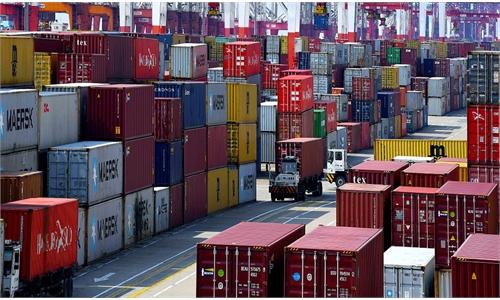
Cargo ships carrying containers pile up at the Ningbo Zhoushan Port in Ningbo, East China's Zhejiang Province on Tuesday. The boom in container throughput for foreign trade comes as the country's yuan-denominated exports jumped 30.1 percent year-on-year in the first five months, customs data showed Monday. Photo: cnsphoto
After China officially applied to join the 11-member Comprehensive and Progressive Agreement for Trans-Pacific Partnership (CPTPP), members of the major Asia-Pacific trade pact showed different attitudes, with Japan showing a somewhat ambiguous, cautious stance, while countries like Singapore expressing support.
The hardest obstacles might still come from Australia and Canada, which are close US allies and seem to be stuck in an anti-China political wave, Chinese experts said. However, while there could be a long, bumpy road ahead before formal accession, China will inevitably become a member, given the irresistible Chinese market and China's own intensifying reform and opening-up efforts, the experts noted.
China on Thursday officially filed a written request for CPTPP membership with New Zealand Minister for Trade and Export Growth Damien O'Connor, acting CPTPP depositary, the Ministry of Commerce said in a late-night statement on its website.
The decision was made after a year of informal contact with CPTPP members and was based on comprehensive research and appraisal of the terms of the trade pact, Zhao Lijian, a spokesperson for the Chinese Foreign Ministry, told a press briefing on Friday, adding that going forward, China will conduct necessary consultation with all member countries.
The CPTPP, signed in 2018, removes tariffs on an estimated 95 percent of goods traded between member countries, including Australia, Canada, New Zealand and Singapore.
As China seeks to be part of the pact, discussions have arisen as to whether China will receive a nod from all the member countries in the pact, particularly those that have souring relations with China, such as Australia and Canada. A country must get the consent of all existing CPTPP members.
So far, some member countries have shown positive attitudes. For instance, Singapore's Minister for Foreign Affairs Vivian Balakrishnan "welcomed" China's interest in the CPTPP during his recent meeting with China's Minister of Foreign Affairs Wang Yi, according to a statement published by Singapore's Ministry of Foreign Affairs.
However, Japan's attitude toward China's participation, in comparison, seems to be more ambiguous. Bloomberg on Thursday cited Japan's Foreign Minister Motegi Toshimitsu as saying that Japan must look properly at whether China is ready to reach the high requirement of the pact, and that Japan will confer with other member countries to handle China's application.
Japanese Prime Minister Yoshihide Suga also reportedly said in an earlier interview that it's difficult for China to join the CPTPP, as it requires member countries to have a fairly high level of market opening.
New Zealand's Ambassador to China said in an interview with Caixin earlier that it is open to engaging informally with other economies that have shown interest in joining CPTPP.
Chinese experts said that certain CPTPP members, particularly Australia, will be under pressure from the US to make China's CPTPP application very difficult, as they seek to exclude China from major international trading blocs to prevent China's rising economic capability and influence.
The US was a member of the original version of the pact known as the TPP, which it spearheaded in an apparent attempt to isolate and contain China, but former US President Donald Trump pulled the US out.
Foreign media outlets have already been pushing a narrative that China's move on Thursday was a response to the AUKUS security alliance among the US, the UK and Australia announced just a day earlier.
Asked about whether China's decision was related to the AUKUS at a press briefing in Beijing, Zhao said that China's move had nothing to do with the AUKUS, while stressing that China was promoting cooperation and the US was pushing for war.
Chen Hong, director of the Australian Studies Centre at East China Normal University in Shanghai, said that the CPTPP talks should be an "excellent" chance for Australia to lift China-Australia relations out of the low ebb, but he is not optimistic about the Australian government supporting China's entry into CPTPP, at least not for the time being.
"It needs political wisdom for Australia to support China's entry. For now, I think this is very hard considering that the current Australian administration is swept away with irrational anti-China sentiment," he told the Global Times on Friday.
The situation might be the same for Canada, which could also face pressure from the US, Chen said. However, he stressed that most CPTPP members, including New Zealand and Japan, would take a more pragmatic approach to the issue for the sake of economic benefits.
Thirst for Chinese market
However, despite the potential challenges, experts stressed that countries are thirsty for China's vast market not only in terms of traditional commodities, but also the services industry, and therefore they will seek to secure business cooperation with China via such regional agreements as CPTPP.
For instance, when Japanese cars lose favor in China because of China's development of electric vehicles, it will see China's cooperation in areas like tourism, services and finance, to which the CPTPP will provide a sound cooperation basis and favorable terms, said Tian Yun, former vice director of the Beijing Economic Operation Association.
"With China's economic rise, it's inevitable that a new trade cycle led by China will be formed, with China providing medium and high-level products in exchange for agricultural and raw materials from other countries," he said.
But Tian also noted that China's joining the CPTPP needs lengthy talks, during which China needs to understand the CPTPP's technical standards on issues like labor protection and revamping state-owned enterprises, and then make reforms accordingly.
For example, China will need to carry out further state-owned enterprise reforms, like on share ratio, to be in line with the standards agreed by CPTPP members. "But the first thing to do is to clear the judging standards," he said. "The talks might take as long as 10 years, but China will eventually make it."
China has already been deepening reform and opening-up efforts, which will help the country meet certain standards and terms in the CPTPP, Chinese experts said, noting that the official announcement on Thursday means that China has already prepared for negotiations, as it has already studied the terms.



